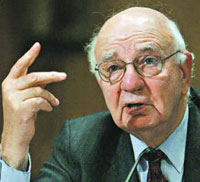World Bank faces serious corruption problems
Paul Volcker, former Federal Reserve chairman, on Wednesday blamed World Bank staff and directors for failing to take corruption sufficiently seriously and said this had been the root cause of strife over its internal anti-corruption watchdog.

Mr Volcker's comments come ahead of Thursday's release of a report that concluded the Bank's anticorruption unit should be stripped of responsibilities for minor staff misconduct and placed under new oversight.
Mr Volcker's comments will be seen by supporters of Paul Wolfowitz as a vindication of the former bank president who was forced from office in an ethics scandal, but present tricky challenges for his successor, Robert Zoellick.
In an interview with the FT on Wednesday, Mr Volcker said his inquiry had "reconfirmed" there was "ambivalence in the bank as to whether they really want an effective anti-corruption programme or not". "The board itself has been ambivalent."
He indicated this uncertainty extended to ministers and representatives of its leading donors. He saw "some parallels" with his prior investigation into the United Nations' handling of the oil-for-food programme.
The tabular content relating to this article is not available to view. Apologies in advance for the inconvenience caused.
While every bank official who talked to his committee claimed they took corruption seriously, he doubted this was always the case.
There were "legitimate complaints on both sides" about the anti-corruption unit. But he attributed the tension largely to those at the bank not sincerely committed to its anti-corruption efforts, saying this was the "underlying fundamental" problem, FT.com reports.
Part of the problem may be the continued concern that anti-corruption efforts can be seen as "anti-development," the report said, citing a tendency to avoid confrontation with borrowing countries who are members of the World Bank Group.
"A lack of common purpose, distrust, and uncertainty has enveloped the anticorruption work of the bank," the report said.
It said some World Bank units "have failed to recognize the importance of anticorruption and governance efforts in working with client nations."
The report makes some specific recommendations, including giving the integrity department's director the rank of vice president, moving responsibility for investigating minor staff misconduct out of the department, increasing diversity of the unit's staff and subjecting the department to regular internal audits and other measures to evaluate its performance.
The bank said it would establish a working group to consider the recommendations and will post the report and its own proposals on its Web site, washingtontimes.com reports.
Source: agencies
Subscribe to Pravda.Ru Telegram channel, Facebook, RSS!




